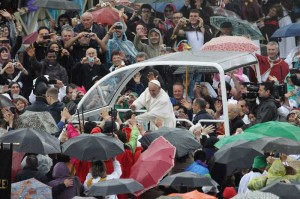 Pope Francis urged religious, political and intellectual leaders, especially Muslims, to condemn fundamentalist and extremist interpretations of religion that seek to justify violence.
Pope Francis urged religious, political and intellectual leaders, especially Muslims, to condemn fundamentalist and extremist interpretations of religion that seek to justify violence.
In an address to members of the Diplomatic Corps attached to the Holy See, the pontiff commented that “religious fundamentalism, even before it eliminates human beings by perpetrating horrendous killings, eliminates god himself, turning him into a mere ideological pretext”.
He went on to say that this attitude gave rise to “a culture of rejection which severs the deepest and most authentic human bonds, leading to the breakdown of society and spawning violence and death”, according to the official Vatican Radio website.
The reference was understood to be to the terrorist attack on the offices of the French weekly Charlie Hebdo in Paris, where 12 people, including journalists and police, were killed Jan 7 and five more people died in terrorist violence over the following two days.
“Rejection is an attitude we all share; it makes us see our neighbour not as a brother or sister to be accepted, but as unworthy of our attention, a rival, or someone to be bent to our will,” he added.
This is the mindset which fosters that “throwaway culture” which spares nothing and no one: nature, human beings, even god himself, the Pope said. It gives rise to a humanity filled with pain and constantly torn by tensions and conflicts of every sort.
Pope Francis also had words of remembrance for the 132 schoolchildren who were killed by terrorists in December at a school in Peshawar in northwest Pakistan, describing the incident as “unspeakable brutality”.
“To their families I wish to renew my personal condolences and the assurance of my continued prayers for the many innocents who lost their lives,” the Pope underlined.
He also called on the international community to unite in efforts against violence and to bring about peace.
“A unanimous response is needed, one which, within the framework of international law, can end the spread of acts of violence, heal the deep wounds,” he said.